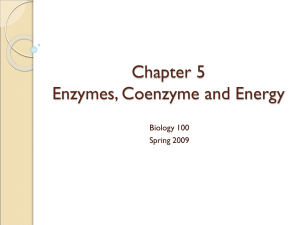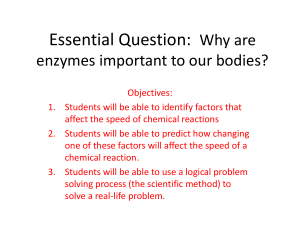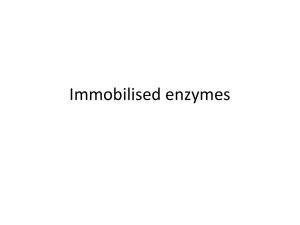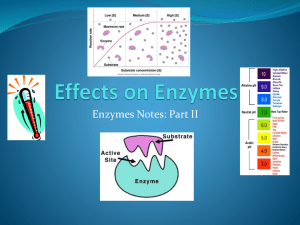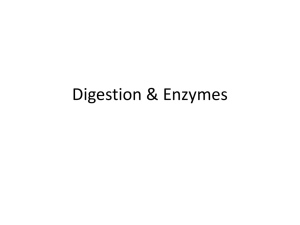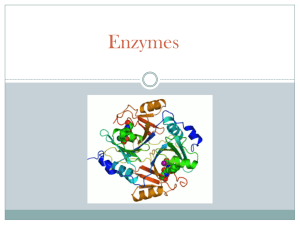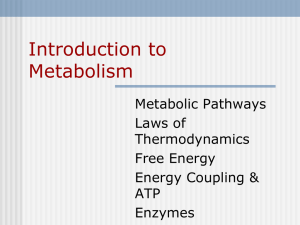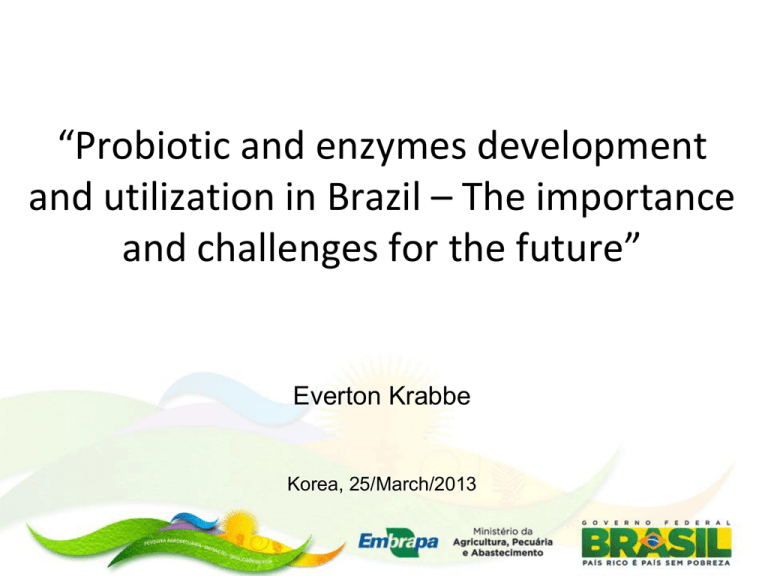
“Probiotic and enzymes development
and utilization in Brazil – The importance
and challenges for the future”
Everton Krabbe
Korea, 25/March/2013
•
•
•
•
•
•
Swine Health
Ambient Control
Constructions
Social-Economy
Vegetal Production
Etc ...
•
•
•
•
Technology Transfer
External Clients
Embrapa´s Clients
Etc ...
General research facilities
• Animal health laboratory: virology, bacteriology, anatomyhistopathology, clinic analysis, and molecular genetics
• Physic-chemical analysis laboratory: animal nutrition,
environmental impact, and chemical residues
• Experimental farms for pigs and poultry
• Pig and poultry genetic selection farm
• Feed mill
• Experimental unit for metabolic studies
• Pig experimental units with individual cages
Welfare
• Pre-slaughter manegement and meat quality
• Imunocastration
• Reduce mortality trough early nutrition
Economics
• Evaluation of regional competiveness and the effect of
public policies on performance of swine and poultry
productive chain
• Evolution of swine and poultry production cost in different
States and Countries
• Optimal slaughter wt
Nutrition
• Improve efficiency of utilization of corn
• Nutrition management of young animals
• Nutrition management during reproductive phase
• Use of plasma in diets for gestating and lactating
sows
• Feed management during growing – finishing
phases
• Feedstuffs evaluation
Breeding and Genetics
• Mapping swine genomic regions of economical
interest
• Estrategies to develop meat quality and
performance traits in swine and poultry production
Food Safety
• Development of a swine production system
with no antibiotics in the feed
• Ractopamine residues
Environment
• Nutritional tools to reduce pollutant potential of
pig wastes
Training / Consulting
• Industrial pig and poultry production
• Swine truck drivers training
• Pre-slaughter welfare training
• Special training for small familiar swine and
poultry business
• Feed processing
• Help to organize Ethiopian Swine Production
Chalenges ...
1
2
3
4
5
6
7
8
•
•
•
•
•
•
•
Production cost reduction
Reduce labor dependence
Welfare
Reduce use of antibiotcs
Environment and natural resources
Meat quality
Production standarts / facilities and
equipments
• Reduce Brazilian genetic material
dependence
Products derived from SSF
PROBIOTICS
METABOLITES:
Enzymes;
Organic Acids;
SSF
Antibiotics.
ORGANICS
MINERALS
PREBIOTICS
Products derived from SSF
PROBIOTICS
Step 1
(12 – 24 month)
METABOLITES:
Enzymes;
Organic Acids;
SSF
Antibiotics.
ORGANICS
MINERALS
PREBIOTICS
Products derived from SSF
PROBIOTICS
Step 1
(12 – 24 month)
METABOLITES:
Enzymes;
Organic Acids;
SSF
PREBIOTICS
Antibiotics.
ORGANICS
MINERALS
Herbal extracts
Products derived from SSF
Step 2
PROBIOTICS
(24 – 48 month)
METABOLITES:
Enzymes;
Organic Acids;
SSF
Antibiotics.
ORGANICS
MINERALS
PREBIOTICS
SUBSTRATES - Perspectives of by-product use and environmental aspects
Suggarcane
Bagasse
Maniot
Bagasse
Citric Pulp
GLYCEROL
Wheat bran
Enzymes in Animal Nutrition is a fact!
ECONOMICS
Maximization of responses
ENZYME
SUBSTRATE
ENVIRONMENT
SUCCESS
Searching for key responses:
1. Understand much better raw materials;
2. Understanding enzymes;
3. Understanding the animals;
4. Understanding the feed producing process.
Animal deppending aspects
• Fact: During the past 20 years animals improved performance by
30%;
GENETICS • Question: Actual breeds are in line with enzyme nutritional matrix?
SEX
HOUSING
• Fact: Requirements different for sexes;
• Question: Should we have nutritional matrixes by sex?
• Fact: Experimental data are generated under perfect environments;
• Question: Do enzymes respond differently under filed condition?
Products derived from SSF
PROBIOTICS
METABOLITES:
Enzymes;
Organic Acids;
SSF
Antibiotics.
ORGANICS
MINERALS
PREBIOTICS
Enzyme sources
Exogenous
Endogenous
Enzyme
Ingredient
Enzyme
Enzyme
Enzyme sources
Exogenous
Endogenous
Enzyme
Enzyme
Ingredient
Enzyme
Probiotics
GIT x PHYTASE
CHEMICAL
MICROBIAL
• High Ca decrease action of
phytase (Nahapetian e Young,
1980);
• Low P increase the action of
alcaline phosphatase
(Mohammed et al., 1991);
• Low Zn decrease phytase action
(Davies e Flett, 1978);
• High Mg decrease phytase action
(Mc Cuaig et al., 1972)
• Several spp. of microbes of GIT
produce enzymes;
• Endogenous secretion.
Intestinal integrity
(BARDOCZ, 1992)
Maximization of response
ENZYME
SUBSTRATE
ENVIRONMENT
SUCESSO
Knowledge about antinutritional components
Composição de diferentes alimentos em polissacarídeos não amiláceos (% MS)
Alimento
Celulose
Arabinose
Xylose
Manose
Galactose
Àc. urônico
B-glucano
Total
Cevada
4,3
2,8
5,3
0,3
0,2
0,4
4,2
17,5
Milho
2,2
2,0
2,7
0,3
0,5
0,7
0,1
8,2
Centeio
1,6
3,6
5,8
0,4
0,4
0,3
1,6
11,0
Sorgo
2,2
2,0
0,9
0,1
0,2
1,3
0,2
6,9
Trigo
2,0
3,1
4,8
0,3
0,4
0,4
0,8
11,8
Canola*
5,9
4,3
1,7
0,4
1,8
4,8
--
18,9
Soja*
6,2
2,3
1,8
0,9
3,5
3,7
--
18,4
Girassol*
8,9
2,5
4,0
1,0
1,1
5,3
--
22,8
Aveia
8,2
1,8
8,0
0,3
0,7
1,0
2,8
22,8
Ervilha
5,3
3,6
1,3
0,2
0,7
3,2
--
14,3
Algodão*
9,2
3,4
6,0
0,4
1,2
4,5
--
24,7
Linhaça*
5,3
3,6
6,6
0,4
3,3
6,8
--
26,7
Glutenose
7,5
6,8
10,4
0,4
1,8
6,6
0,2
33,7
* Farelo
Classen, 1996; Knudsen, 1997; Choct, 1997
Variability of ME in Corn for broiler
A M E n , k c a l /k g a s is
Mean= 3218 kcal/kg ± 162
3600
Standard - 1991 Harvest year
3400
3200
3000
2800
2600
1 2 3 4 5 6 7 8 9 10 11 12 13 14 15 16 17 18 19 20 21 22 23 24 25 26
Corn Sample #
Leeson et al .,1993
Variability of corn chemical composition (59 samples)
(Danisco Animal Nutrition)
Base (MS) Starch (g/Kg) CP (g/Kg) Fat (g/Kg) Amilose:Amilopect
Mean
674
80,3
44
0,31
SD
23
5,9
4,5
0,05
Min
628
71
34,7
0,21
Máx
720
94,5
52,4
0,44
Cowieson, 2005.
1,33%
Phytic Acid in
Soybean
0,93%
Paula, S.A. de, 2007 - UFV
ENERGY VALUE (AMEn) OF CORN AND SBM
3340
CP = 7,88%
EB = 3940
3381
3154
CP = 45%
EB = 4090
2254
?
Maximization of response
ENZYME
SUBSTRATE
ENVIRONMENT
SUCCESS
More than 200 enzymes
commercially available
PERSPECTIVES FOR THE FUTURE?
Digestibility of NSP
Carboidrato
PNA Total
Arabinose
Xilose
Manose
Aves
12
13
14
0
Suínos
84
104
103
72
Adaptado de Choct e Kocker, 2000.
GREAT SEARCH?
Dosing systems of enzymes ajusted in real
time to the substrate...
GREAT SEARCH?
Dosing systems of enzymes ajusted in real
time to the substrate...
Goal 1. Characterization of substrate “in
line” – quali e quantitatively...
GREAT SEARCH?
Dosing systems of enzymes ajusted in real
time to the substrate...
Goal 2. Availability of enzymes “in line” –
according substrate...
GREAT SEARCH?
Dosing systems of enzymes ajusted in real
time to the substrate...
Goal 3. In line opperating systems – dosing
enzymes according substrate.
GREAT SEARCH?
Dosing systems of enzymes ajusted in real
time to the substrate...
SOLUTION: Integration of
knowledge areas...
SUBSTRATE
ENZYMES
APLICATION
In-line dosing systems
NIR
Substrate 1
Substrate 2
Substrate 3
C:\notes\Post Pellet Liquid Application -1
R&D Line 1: Variability of raw
materials in Brazil?
Climate
Cultivar
Region
Soil
Fertility
Period
Perspectives for Enzymes applyied
to Animal Nutrition
Needs and opportunities?
1. Understand substrates and quantification;
2. Understand type of enzymes and quantification
(some extent available);
3. Understand the working conditions of each
individual enzyme;
4. Development of new enzymes with potential
opportunities for animal nutrition, management,
health.
Projects under development
Thank you,
everton.krabbe@embrapa.br


